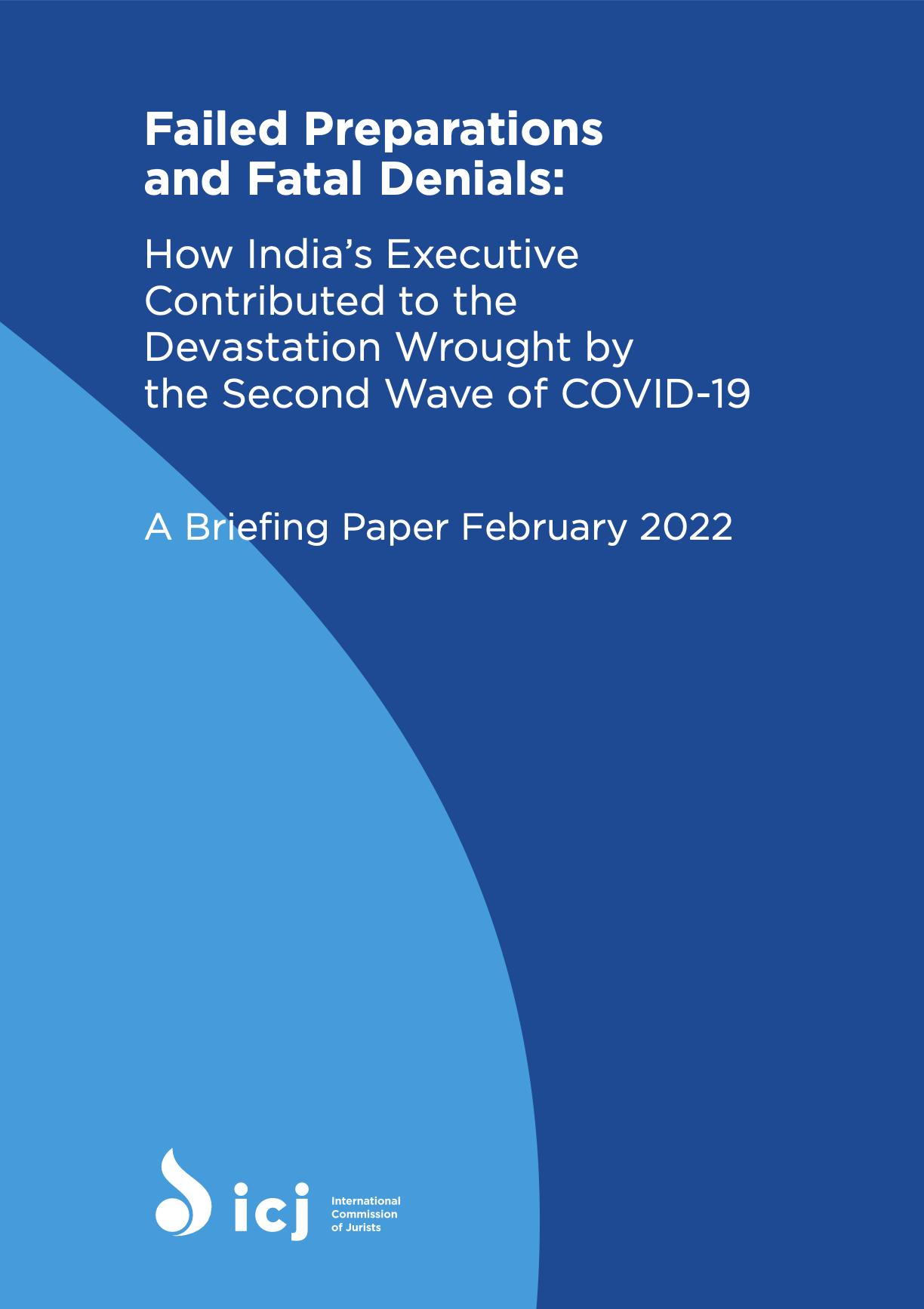The Indian Government’s failure to prepare effectively for and respond to the second wave of COVID-19 in 2021 contributed to devastating health consequences and human rights violations, the International Commission of Jurists (ICJ) said in a briefing paper published today.
The briefing paper shows that the shortcomings in the official response to the second wave of Covid-19 were connected to the failure to observe rule of law principles, as the Indian executive usurped legislative powers in order to respond to COVID-19. This assumption of legislative functions also deprived the legislature of a check on executive action. In addition, the judicial role was undermined as the Government failed to fully implement a number of court orders, resulting in a lack of preparedness for the second wave of COVID-19 in India.
The ICJ called on the Indian authorities to learn lessons from the failed preparations and fatal denials that led to the health calamity and loss of life during the second wave of COVID-19 in India. This is especially critical at a time when the world is struggling to respond to renewed outbreaks of COVID-19, as the Omicron variant spreads, and highlights once again the importance of comprehensive and coordinated preparations of health systems worldwide.
“The Indian Government’s failure to ensure equitable and consistent oxygen supply throughout the country contributed to entirely preventable deaths”, said Mandira Sharma, ICJ South Asia Senior Legal Adviser.
“The Government has preferred to deny its shortcomings, while censoring free expression and threatening to criminally prosecute desperate attempts to access oxygen on social media”, she said.
The Indian Government assumed significant powers under laws such as the Disaster Management Act, but did not transparently provide a specific plan of action for combatting the second wave of COVID-19. The Government also failed to maximize access to and make full use of available critical health-related resources, including oxygen.
The briefing paper provides recommendations to the Indian authorities aimed at assisting it in providing more effective future health emergency responses and ensuring compliance with its international human rights obligations, including protecting the right to health.
Some of these recommendations are:
- Develop and implement a specific and time-bound plan and strategy, with clarity on roles and responsibilities of different executive authorities in preparing for and responding to waves of COVID-19.
- Review and amend the Epidemic Disease Act and Disaster Management Act to incorporate time limitations clauses and provide for effective legislative review and oversight over executive measures. Comply with judicial orders around health emergencies.
- Review and amend overbroad legal provisions such as Section 69A, Information Technology Act, that allow for censorship for expressing an opinion or sharing information on social media.
- Urgently undertake and widely publicize an audit of the ready availability of essential drugs and other medicines, oxygen and other essential COVID-19 health facilities, goods and services throughout the country.
Background
The second wave of the COVID-19 pandemic in India occurred between mid-March and mid-May 2021. The reported death count was at least 166,632, a figure which experts believe to be a substantial undercount of the actual total. At the peak of the second wave in India, India had the largest number of reported daily new cases globally at over 400,000, with over two and a half million active cases of COVID-19 in that period.
During the second wave, the Indian healthcare system faced deficit supply in medical oxygen in certain states. In addition, hospitals experienced severe shortages of hospital beds, essential medicines as well as personnel. Ultimately testing laboratories and crematoriums were unable to keep up with the surge, which in turn hampered hospital admissions, as hospitals required positive COVID-19 RT-PCR tests to admit a patient. Hospitals, family members and patients themselves were reportedly forced to turn to courts and to make pleas on social media to gain access to oxygen supply. These efforts were often unsuccessful.
Many courts initiated suo moto action and held daily hearings and often multiple hearings in a single day to attempt to provide support and direction to the government, sometimes expressing exasperation at the lack of measures implemented by authorities to safeguard human life and public health.
These often belated efforts of hospitals, civil society, and courts, did not compensate for the lack of preparedness for the second wave of the COVID-19 pandemic.
Download the briefing paper here.
Contact:
Mandira Sharma, Senior South Asia Legal Advisor, mandira.sharma@icj.org





